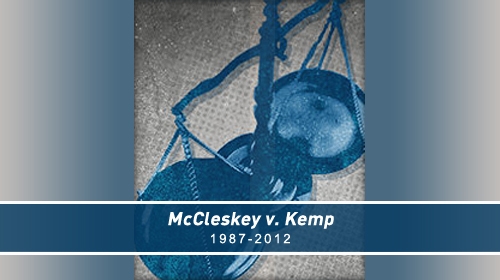
April 22 marks the 25th anniversary of the Supreme Court decision in McCleskey v. Kemp, in which the Court ruled that a defendant cannot rely upon statistical evidence of systemic racial bias to prove his death sentence unconstitutional, no matter how strong that evidence may be. McCleskey has been roundly condemned as a low point in the quest for equality that begs to be revisited. To mark the occasion, every day this week the ACLU Blog of Rights will feature a new post about McCleskey and its legacy. You can read all the posts here, and visit mccleskeyvkemp.com to learn more.
It took Florida authorities nearly six weeks to arrest George Zimmerman and charge him with second-degree murder of Trayvon Martin, a delay that led many to question the response by the police in Sanford, Fla. to Martin's killing. It is alleged that Zimmerman had followed an unarmed Martin, a 17-year old Black youth through a gated community, confronted him, and then shot him in the chest, despite 911 operator requests to Zimmerman to leave the youth alone.
Community outrage turned national during the lengthy period when Zimmerman was neither charged nor arrested: few doubted that the same acts committed against a suspicionless white victim would have resulted in an immediate arrest and murder charges. And we hurt all the more because it appears that what happened to Martin was part of a larger picture of the daily indignities and tragedies endured by victims of racial profiling.
Of course, we don't advocate a rush to judgment for Zimmerman or anyone suspected of a crime. We firmly believe the process should play out fairly and equally, without regard to the race of the accused or the race of the victim.
When a justice system appears to value some victims less than others, it ceases to be just. That is a problem that did not start with the Trayvon Martin case, or even with the Supreme Court's notorious decision in McCleskey v. Kemp. It is a problem in the DNA of our country. It traces as far back as post-Civil War Reconstruction, when lynchings were used as vigilante punishment for Blacks accused of crimes against whites. The practice was officially folded into the justice system as capital punishment, used regularly in the South against Black men accused of raping white women but rarely against white men accused of raping Black women.
This discrimination was a basic truth the Supreme Court faced in 1977 when it ruled the death penalty unconstitutional for rape, and a key concern of some of the justices when the Court briefly ruled the death penalty unconstitutional for all crimes in 1972.
By the time the Court decided McCleskey in 1987, racial considerations had become so ingrained in the criminal justice system that the Court concluded that they were an "inevitable part" of it and ruled that statistical evidence of systemic racial bias could not be used to overturn a death sentence.
With the Court's approval, the troubling statistics that Warren McCleskey sought to use to overturn his death sentence — which showed, among other things, that defendants convicted of murdering white victims were over four times more likely to be sentenced to death as defendants charged with murdering Black victims — continue to occur across states with the death penalty, and people continue to be sentenced to death under a system tainted by racial bias. In fact, studies consistently show that the best predictor of who lives or dies at the State's hands is not the content or context of the crime, but the color of the victim's skin.
In other words, kill a white person and pay the ultimate price. Kill a Black person, and pay less.
The right solution would not be more death sentences for people who kill Black victims in a race-based effort to balance the books. A far better option would be the reversal of McCleskey and the passage of racial justice laws like North Carolina's across the states retaining the death penalty. But even those admirable solutions would be second-rate attempts to patch a sinking ship.
The safest and surest way to ensure that the racial bias so ingrained in our criminal justice system does not enter into a decision of who lives or who dies is simply to eliminate capital punishment.
Learn more about race and the death penalty: Sign up for breaking news alerts, follow us on Twitter, and like us on Facebook.


